
Understanding Caster Wheel Types for Your Industrial Needs
Caster wheels play a crucial role in various industries, facilitating the movement of heavy loads and equipment with ease and efficiency. However, selecting the right caster wheels for your industrial needs can be a daunting task, given the wide range of options available in the market. In this comprehensive guide, we will explore the key factors to consider when choosing caster wheels for your specific requirements, ensuring optimal performance, durability, and safety in your industrial operations.
Understanding Your Requirements:
Before delving into the specifics of caster wheels, it is essential to understand your industrial requirements thoroughly. Consider factors such as the type of flooring in your facility, the weight and dimensions of the loads to be transported, the frequency of movement, and any specialized conditions or environments that may impact caster performance.
Industry-Specific Caster Wheel Applications
-
Manufacturing: In manufacturing environments, where heavy machinery and equipment are moved regularly, heavy-duty casters with high load capacity and durability are essential. Forged steel wheels are often favored for their ability to withstand the rigors of manufacturing floors, offering superior durability and the ability to handle heavy loads without deforming. Swivel casters with roller bearings provide smooth movement and easy maneuverability, especially in tight spaces where precision is critical.

-
Healthcare: In hospitals and healthcare settings, the need for smooth, quiet operation and frequent sterilization makes stainless steel casters with non-marking rubber wheels a top choice. These wheels provide a cushioned and quiet ride, essential for patient comfort and safety. The polished aluminum core of these wheels resists corrosion, ensuring longevity even in wet environments.
-
Food Processing: For food processing plants, cleanliness and resistance to harsh chemicals are paramount. Casters made from premium cast iron with a protective coating are ideal for environments that require frequent washdowns. These wheels are also abrasion-resistant, ensuring they can withstand the daily grind without degrading.

-
Warehouse and Distribution: Warehouses and distribution centers need wheels that can handle rough surfaces, varying loads, and continuous movement. Pneumatic wheels or semi-pneumatic wheels are excellent for navigating uneven terrain, while polyurethane wheels possess the durability to handle heavy loads over smooth surfaces without causing permanent flat spots.
Types of Caster Wheels:
Caster wheels come in a variety of types, each designed to meet specific industrial needs. The most common types of caster wheels include:
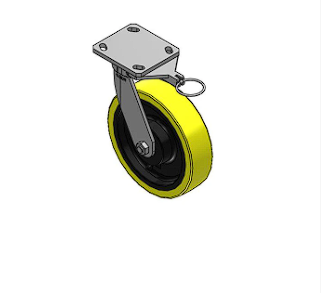
-
Swivel Casters: Swivel casters feature a swiveling mechanism that allows for multidirectional movement, making them ideal for applications requiring flexibility and maneuverability. These casters are particularly useful in environments where equipment needs to navigate around obstacles or through tight spaces.
-
Rigid Casters: Rigid casters have a fixed wheel orientation, providing stability and straight-line movement. They are often used in conjunction with swivel casters to create a balanced and versatile caster system, offering both maneuverability and stability
-
Heavy-Duty Casters: Heavy-duty casters are designed to withstand high loads and intense usage, making them suitable for industrial environments with demanding conditions. These casters often feature ductile steel wheels, which can carry heavier loads without risk of deformation, ensuring long-term reliability in harsh conditions.
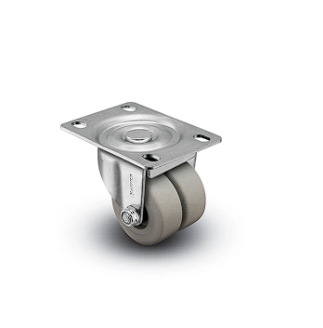
-
Dual Wheel Casters: Dual wheel casters feature two wheels mounted side by side, offering increased load capacity and stability. They are commonly used in applications requiring enhanced weight distribution and durability, such as moving large machinery or heavy industrial equipment.
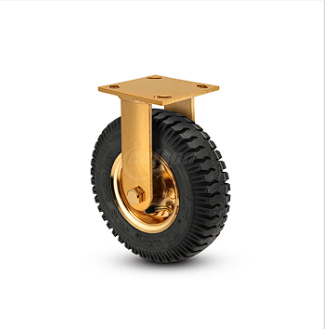
-
Pneumatic Casters: Pneumatic casters are equipped with air-filled tires, providing shock absorption and smooth movement over uneven surfaces. They are ideal for outdoor applications or environments with rough terrain, where other wheels might struggle to provide a smooth ride.
-
Stainless Steel Casters: Stainless steel casters are corrosion-resistant and hygienic, making them suitable for food processing, pharmaceutical, and medical applications where cleanliness is paramount. The polished aluminum wheel core in these casters also enhances their resistance to corrosion and ensures a long service life.
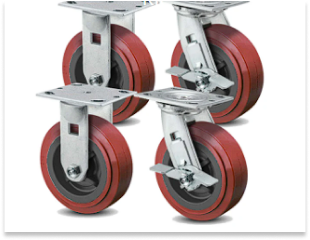
Key Considerations When Choosing Caster Wheels:
When selecting caster wheels for your industrial needs, several key considerations should be taken into account:
Load Capacity: Load capacity is perhaps the most crucial factor when choosing caster wheels. It’s essential to determine the weight of the heaviest load that the caster wheels will need to support. Consider the possibility of uneven weight distribution, which might place more stress on certain wheels. Choosing casters with a load capacity that exceeds the maximum load requirement ensures safe and reliable operation, preventing issues like wheel deformation or failure under pressure. Heavy-duty caster wheels, such as those made from forged steel, are excellent for handling significant loads without compromising performance.
Wheel Diameter:The diameter of the caster wheel affects its mobility and load-bearing capacity. Larger diameter wheels provide better weight distribution and roll more easily over obstacles, making them ideal for environments with uneven flooring or minor debris. Smaller diameter wheels, on the other hand, offer greater maneuverability in tight spaces, making them suitable for applications like indoor cart movement where precision is needed. Larger wheels, such as those with a v-groove design, are particularly effective for guided movements along tracks, providing stability and ease of movement in heavy-duty applications.
-
Wheel Material: Caster wheels are available in various materials, including rubber, polyurethane, nylon, and steel. Each material has its own unique properties and benefits. Rubber wheels offer shock absorption and non-marking properties, polyurethane wheels provide excellent durability and resistance to chemicals and abrasion, nylon wheels are lightweight and corrosion-resistant, and steel wheels offer superior load-bearing capacity and durability.

Floor Surface: Consider the type of flooring in your facility, as different caster wheel materials perform better on certain surfaces. For example, soft rubber wheels are ideal for smooth surfaces such as tile or concrete, providing a cushioned ride and protecting the floor from damage. Hard rubber wheels or polyurethane wheels are better suited for rough or uneven surfaces, offering durability and resistance to wear. In environments where floor protection is crucial, floor-protective wheels, such as those made from liquid cast polyurethane, provide the necessary durability without compromising the integrity of the flooring
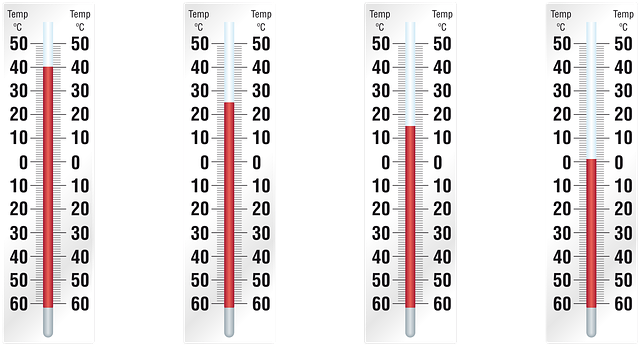
Environmental Conditions: Environmental factors can significantly impact caster performance. For instance, extreme temperatures, exposure to moisture, or the presence of chemicals can degrade certain materials. Selecting casters with appropriate seals, coatings, or materials ensures longevity and reliable performance in these conditions. Pneumatic tire casters, for example, are excellent for outdoor use, providing a cushioned ride over uneven terrain while withstanding exposure to moisture and temperature fluctuations.
Ergonomics: Ergonomics play a critical role in worker safety and comfort. Casters with shock-absorbing properties, such as those with rubber or polyurethane treads, reduce strain on workers by providing a smoother ride and minimizing vibrations. Additionally, noise-reducing wheels, such as those with ball bearings, can create a quieter work environment, reducing the risk of hearing damage and improving overall comfort.
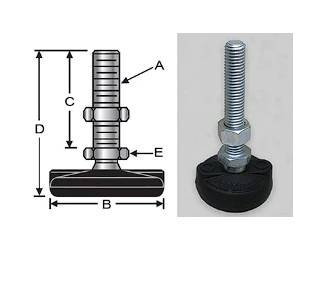
-
Mounting Type: The mounting type required for your application—whether it be a stem mount, plate mount, or threaded stem—should be carefully considered. Ensure compatibility with your equipment and consider factors such as swivel radius and mounting height. The proper mounting type not only ensures that the caster fits securely but also affects the stability and maneuverability of the equipment.
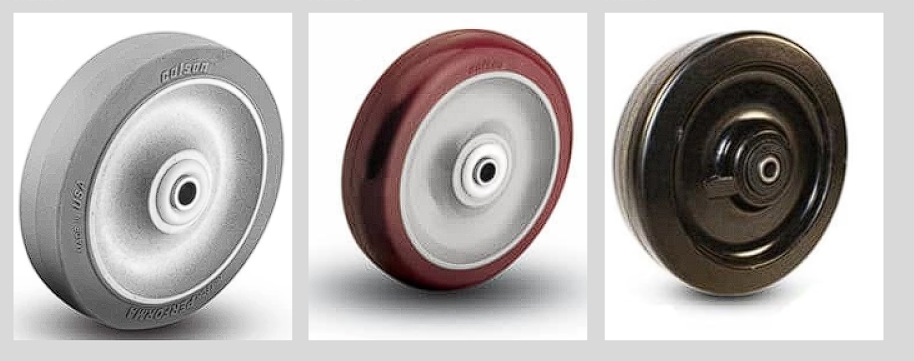
Different Wheel Material Types:
Phenolic Wheels: These wheels are ideal for environments that experience high temperatures, as they can withstand extreme heat without deforming. Phenolic wheels also offer high load capacity, making them suitable for heavy-duty applications where heat resistance is a must.
Polyolefin Wheels: Known for their chemical resistance, polyolefin wheels are perfect for environments where exposure to oils, solvents, or other chemicals is common. These wheels are lightweight yet durable, offering a cost-effective solution for many industrial applications.
Polyurethane HI-TECH Wheels: These wheels are designed for superior durability, providing excellent resistance to wear, chemicals, and abrasion. They are ideal for demanding industrial applications.
Polyurethane on Aluminum Wheels: Combining the durability of polyurethane with the strength of an aluminum core, these wheels offer a balance of resilience and lightweight performance, making them ideal for environments where both load capacity and smooth rolling are important.
Rubber on Iron Wheels: These wheels feature a rubber tread bonded to a cast iron core, offering a cushioned ride with high load capacity. They are perfect for applications where floor protection and quiet operation are important.
Solid Polyurethane Wheels: Made entirely from polyurethane, these wheels offer excellent shock absorption and resistance to wear, chemicals, and oils. They are ideal for environments where durability and floor protection are needed.
Polyurethane on Cast Iron Wheels: These wheels combine the wear resistance of polyurethane with the strength of a cast iron core, making them suitable for heavy-duty applications where high load capacity and durability are required.
Cast Iron Caster Wheels: These wheels are known for their extreme durability and ability to handle heavy loads. They are perfect for harsh environments where the wheels must endure rough surfaces and high-stress conditions.
Endura Solid Elastomer Wheels: These wheels are made from a solid elastomer material that provides a smooth, cushioned ride while offering excellent resistance to wear, chemicals, and abrasion, making them suitable for a wide range of applications.
Glass-Filled Nylon Wheels: Reinforced with glass fibers, these nylon wheels offer enhanced strength and durability. They are ideal for applications where high load capacity and resistance to chemicals and wear are important.
High-Impact Polymer Wheels: Constructed from high-impact polymer, these wheels are designed to withstand heavy loads and rough handling, making them suitable for demanding industrial environments.
Neoprene on Aluminum Wheels: These wheels feature a neoprene tread bonded to an aluminum core, offering a smooth, cushioned ride with excellent resistance to chemicals and abrasion. They are ideal for applications requiring quiet operation and floor protection.
Nylon Wheels: Lightweight yet strong, nylon wheels are resistant to wear, chemicals, and corrosion, making them suitable for a variety of industrial applications where durability is important.
Performa Rubber Wheels: These wheels are made from a soft rubber compound that provides a smooth, quiet ride while offering excellent floor protection and shock absorption. They are ideal for applications where noise reduction and floor safety are critical.

Key Considerations When Choosing Caster Wheels
When selecting caster wheels for your industrial needs, customization options play a crucial role in optimizing performance and durability. Tailoring caster wheels to your specific requirements can significantly enhance their functionality in demanding environments.
Customization Options: Tailored Solutions for Optimal Performance
1. Custom Wheel Materials and Compounds:
Choosing the right material is vital for specific applications. Liquid cast polyurethane wheels offer excellent abrasion resistance, while rubber caster wheels provide floor protection and shock absorption. For heavy-duty needs, forged steel wheels deliver unmatched strength and durability.
2. Custom Wheel Diameters and Profiles:
The size and shape of your caster wheels impact their load capacity and mobility. V groove wheels are ideal for guided tracks, ensuring precision in movement, while larger diameters improve weight distribution and ease rolling effort, essential for moving heavy equipment.
3. Custom Bearing Types:
Bearings are key to smooth operation. Precision ball bearings in swivel castors enhance maneuverability, while roller bearings offer superior load capacity for heavy loads. The right bearings ensure longevity and reduce wear, keeping your operations efficient.
Ensuring Optimal Performance with the Right Customizations
Customization ensures that your caster wheels are perfectly suited to your industrial needs, whether it’s minimizing rolling effort with precision ball bearings or selecting abrasion-resistant materials for durability. At Caster Central, we offer a wide range of customizable industrial casters to meet the exact demands of your operations.
Partner with Caster Central for Expert Guidance
Choosing the right caster wheels is essential for smooth and efficient material handling. By considering your specific requirements and exploring customization options, you can ensure optimal performance and safety. Contact Caster Central today to learn how our tailored solutions can enhance your industrial operations.